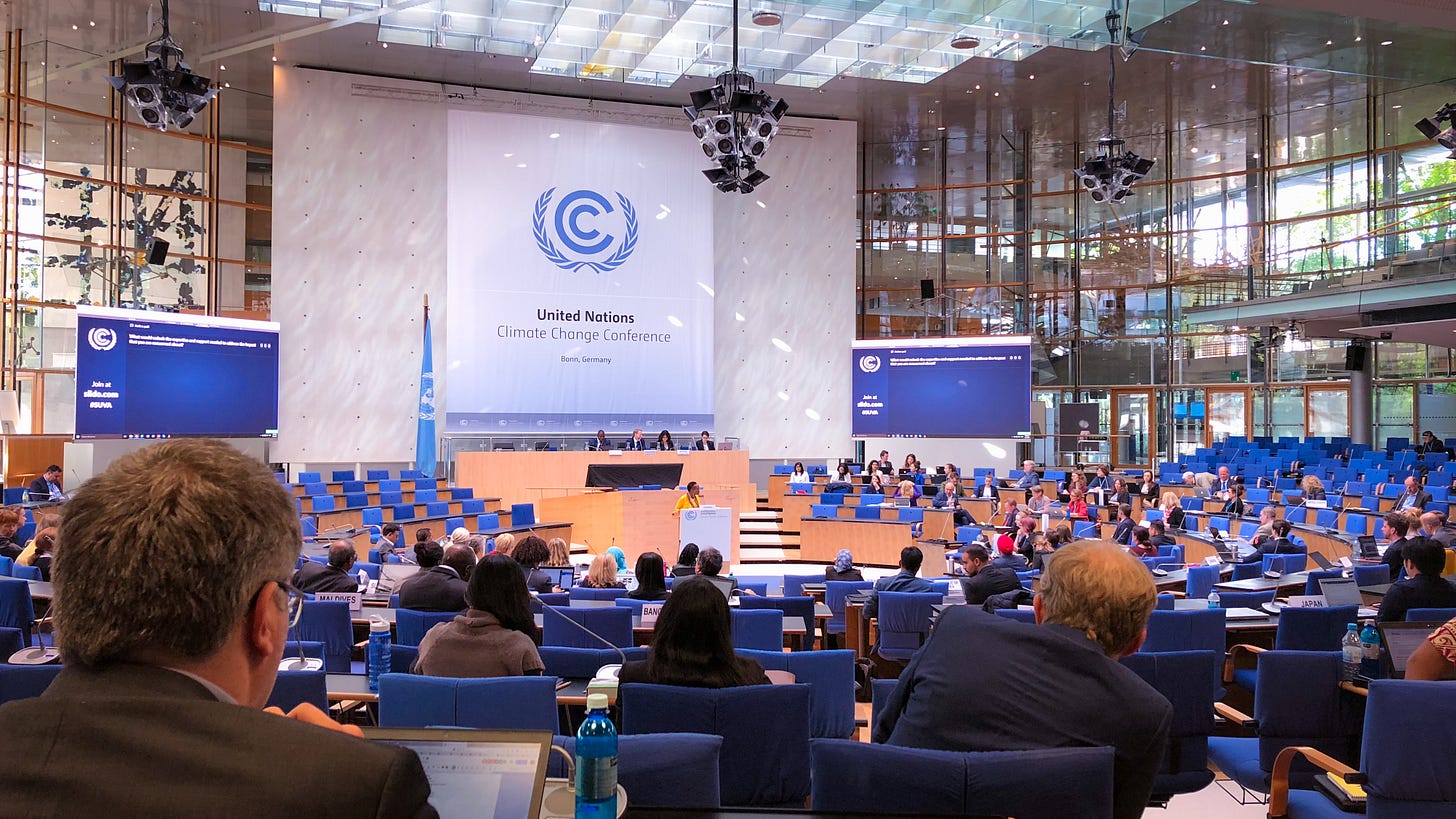196 nations negotiate end of climate pollution
Virtual UN Climate Change meetings resume this week. 196 nations will work to improve cooperation, accelerate decarbonization, and bring timelines for climate action in line with science.
The United Nations Framework Convention on Climate Change (1992) set the mandate “to prevent dangerous anthropogenic interference with the climate system”. The Paris Agreement (2015) brought all nations into the action agenda, created a mechanism for steadily “ratcheting up ambition”, and called for a scientific report to determine whether global heating above 1.5ºC was tolerable.
The Intergovernmental Panel on Climate Change (IPCC) Special Report on Global Warming of 1.5ºC made clear global average temperature rise of that level must be considered the danger threshold. Beyond 1.5ºC global average temperature rise, some small island nations will vanish beneath rising seas, major food growing regions will face serious risk of harvest collapse, extreme climate impacts will generate unprecedented mass migration, and nation-state destabilization could become commonplace.

Each nation has previously put forward its Nationally Determined Contribution (NDC) to avoiding dangerous global heating. Under the Paris Agreement, those NDCs must be steadily upgraded and enhanced, so real climate-friendly industrial and economic transformation is more immediate, far-reaching, and effective.
The June 2021 Virtual UNFCCC Negotiations must grapple with several unwieldy global challenges:
NDCs need to be substantially upgraded;
Transparency and reporting mechanisms need to be enhanced;
Common taxonomies for climate-related financial assessment and decision-making need to be consolidated, and aligned with Paris Agreement goals;
The definition of “action toward net-zero carbon emissions” needs significant clarification;
The effect of rapid, pervasive transformation of industrial and economic systems on trade needs to be better understood.
All of these questions fall together into the debate about common timeframes for planning, action, reporting, and upgrading, and into the Global Stocktake—an overall assessment of need, capability, and achievement, toward the goals of the Paris Agreement. Deep questions of justice arise from decisions about early action, or delayed action, the phasing out of old industries, or the ways in which nations commit resources to new and emerging ones.
Recent court rulings in Germany and the Netherlands have set important precedents, requiring both national policy and private-sector action to happen faster, to avoid imposing undue (and possibly irreversible) climate-related cost and hardship on future generations. Details of “the Paris Rulebook”—not one list of rules, but the overall suite of negotiated standards and processes for full implementation of the Paris Agreement—will be affected by this pressure to significantly accelerate climate action.
The perennial dance, in any major cooperative effort, is very much at work here: Who does what, when, under whose supervision, and with what support?
Citizens’ Climate International comes to these negotiations with a focus on the following areas of action:
Participation
Pollution pricing
Climate-smart finance
Nature: ice, watersheds, and ocean
Food systems
On Participation: We see as critical to the success of any national climate policy and planning effort the regular, ongoing engagement of citizens, communities, and stakeholders in both the design and deployment of climate solutions. Action for Climate Empowerment—the UNFCCC agenda area based in Article 6 of the Convention—offers nations real practical leverage for enhanced climate action, through science-informed, locally rooted, multi-faceted stakeholder networks.
On Pollution Pricing: We support establishment of a global “price floor”, supported by national policies to impose a steadily intensifying price signal disfavoring climate pollution. As the IEA recently noted, “There is no need for investment in new fossil fuel supply...” Pricing systems should effectively and efficiently eliminate climate pollution while building incomes for people and enhancing international cooperation for a zero-emissions future.
On Finance: We support the goal of not only mainstreaming climate-smart finance, but achieving a world in which no money generates climate damage. Public, private, and multilateral finance must rapidly shift into alignment with a zero-emissions future; the fiscal stability of nations must be measured against this science-informed imperative. Climate-smart finance must integrate complex, rapidly evolving Earth systems science data, and foster a decentralized landscape of innovation, Nature-positive production, and resilience-building everyday actions.
On Nature: We take note of the need for much more robust national and cooperative international integration of a Summit to Sea resilience value approach. We need to value, invest to sustain, and safeguard a healthy cryosphere, feeding healthy watersheds and land-based ecosystems, sustaining biodiversity, and preventing harm to ocean life and to the climate chemistry of our ocean.
Food Systems integrate many of the above areas of action. Without a healthy crysophere, stable climate patterns, reliable rainfall, resilient watersheds, ecosystems, and biodiversity, food security is not achievable. Climate action driven by food systems transformation will require:
regenerative farming and other sustainable land management practices;
new kinds of finance, decentralized multisystem data integration, and pollution pricing linked to Nature-positive production;
local participatory process to ensure optimal policy design, protection of basic rights, and inclusive sustainable development.

Running throughout this landscape of needed enhanced action is the mandate all nations face to achieve effective, sustainable recovery from the COVID-related economic crisis. Building resilience is imperative, not within isolated systems, but across systems and sectors. Resilience is not a lofty unicorn kind of goal; it needs to become the baseline for healthy, prosperous societies.
The COVID, climate, and biodiversity crises, together put clear light on the value of solidarity. Solidarity among people, and between nations and generations, and with Nature, is not only an emotional, cultural, or political preference. Recognizing that human and natural systems, our everyday wellbeing, the security of nations, and the livability of the world we leave to future generations, are all part of One Health is already visible as the defining insight of our moment.
We are fortunate that the 1992 Climate Convention, the Paris Agreement, and the 17 Sustainable Development Goals, provide a practical map to action within that One Health worldview. The Virtual SB Meetings cannot concretely establish that we live by a One Health standard, but they can detail, reconfigure, and set in motion many of the structural elements of how nations work together to ensure we achieve earliest possible decarbonization, within a program of inclusive prosperity, to keep global heating to 1.5ºC or below.
The Paris Agreement acknowledges “that climate change is a common concern of humankind” and requires that all countries:
respect, promote and consider their respective obligations on human rights, the right to health, the rights of indigenous peoples, local communities, migrants, children, persons with disabilities and people in vulnerable situations and the right to development, as well as gender equality, empowerment of women and intergenerational equity…
Ensuring climate action and investment meet this standard of equity and solidarity is critical to securing a livable climate future of inclusive sustainable development.
If the June 2021 Virtual Meetings of the UNFCCC Subsidiary Bodies are successful, they will generate important technical innovations and set the stage for formal consensus on the vast and multifaceted list of legal decisions the Parties to the Convention will have to agree ahead of the COP26. There is great hope the COP26 will see a substantial acceleration of timelines for early decarbonization, a global consensus on net-zero before 2050, and an unprecedented mobilization of finance from the public, private, and multilateral sectors, catalyzed by process decisions, to mainstream the climate transition.
Ultimately, every person everywhere has a right to live in a world where collective decisions and mainstream investment uphold and safeguard the health and resilience of natural systems, including Earth’s uniquely optimal climate system. The technical details should be decided by a determination to make sure we get there.
UNFCCC Documents
Agenda for the 2021 Meetings of the Subsidiary Body for Implementation (SBI)
Agenda for the 2021 Meetings of the Subsidiary Body for Scientific and Technological Advice (SBSTA)
Citizens’ Climate Reports & Submissions
Allied Initiatives
Carbon Pricing: The International Climate Income Alliance
Food Systems: The Good Food Finance Initiative
Indigenous Peoples: The Nayzul Declaration
Ocean Economy: Invest at the Source
UNFCCC Process: Climate Action Network International (PDF)
This is a UNFCCC process note from Citizens’ Climate International.


